|
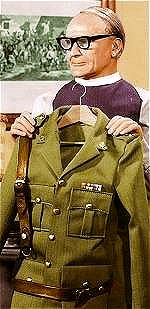
More
combat jackets,
Vicar?
Intro
A
bit of a chat
Stanley
on TSS
Episode
guide
Back
to TV page
|
A
bit of a chat (click on
pix for bigger versions)
With
the launch of his seminal Supermarionation series Captain
Scarlet and the Mysterons (first broadcast in 1967), Gerry
Anderson was on a roll.
But
despite the success he'd had up to then, his next series, Joe
90, never quite grabbed the audience nor the plaudits of
the previous two. Undaunted, Anderson moved on.
His
next idea came out of a meeting at Pinewood Studios while he was
working on his 1968 film Doppelgänger. He'd heard
that one Stanley Unwin was also at Pinewood for post-production
work on Chitty Chitty Bang Bang, so he collared
Stanley's agent and asked if he could have a chat. What came out
of the 'chat' was the bare bones of The Secret Service.
|
Gerry
Anderson:
"I
have always enjoyed Stanley's work and find him very
amusing,. As far as I was concerned, Stanley came first
and the idea had to accommodate him. It wasn't that the
show called for someone who could speak gobbledegook, it
was a question of how we could fit him into the
storyline." |
As an
Unwin fan, it seemed the ideal time to combine their talents. Moreover, Anderson
was keen to work with 'real' actors and saw his next series as
very much a transition to moving almost exclusively to live
action. This proved to be the case until he returned again to
the puppet format in 1983 with the first series of Terrahawks.
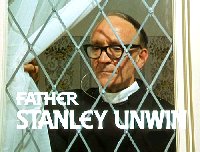 |
'The
name's Unwold...Fardy Unwolders'
|
Anderson's
idea was to combine real life actors and puppet miniatures in a
series that featured Stanley as Father Unwin, an undercover
agent for British Intelligence Secret Headquarters Operation
Priest (BISHOP). The gimmick was that Father Unwin had a special
device called the 'Minimiser' which could...er...minimise
people, namely his gardener and assistant Matthew Harding. Armed
with this tool and Matthew's home office travel case, the two set off to complete the 13 missions that
made up the entire series.
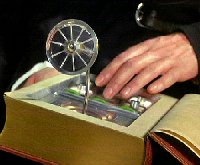 |
The
Minimiser with built-in instruction manual
|
Such
an innovative - and frankly bizarre - concept was not without
its production difficulties. For example, when Matthew's puppet
was minimised, his surroundings had to be to regular scale (i.e.
normal size), but when he was 'life size', the sets had to be
scaled down accordingly to make him look life size. If
you see what I mean.
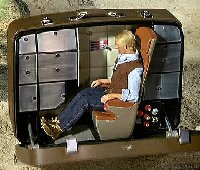 |
The
Man in the Suitcase
|
Stanley
and his Father Unwin puppet were also involved in some trickily
edited sequences such as the one where the real Stanley is
driving Gabriel, his trusty Model T Ford', down to London (now
Heathrow) Airport. "He [Stanley] would stop, get out and
walk into this enormous departure lounge," explained
Anderson. "As he walked up to the desk, we would go bang
into a close-up of the puppet and they were so cleverly matched,
you couldn't tell the difference."
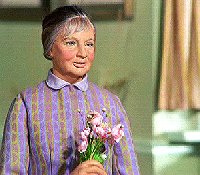 |
The
redoubtable Mrs Appleby
|
Writing
the scripts proved to be quite an interesting process as well,
especially as Stanley's Unwinese was very much a feature.
|
"Gerry
Anderson said: 'Come and meet the script writers'. I
went to Slough, Century 21 studios and met Tony Barwick
[Script Editor]. He said: 'How are we going to do
this?'. I said: 'If you gave me a straight script of all
your ideas, I will translate them into my peculiar sort
of language'." |
Shane
Rimmer, writer of TSS Episode 8, 'Hole In One'
(and the voice of Thunderbirds' Scott Tracey),
also recalled: "A lot of it you had to leave to [Stanley].
You gave him a line of patter that's going to work with what he
does. Because he was such a bizarre character, you felt
you could really go all the way with him: you could practically
do anything."
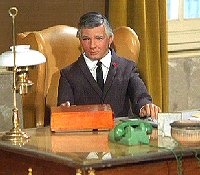 |
The
Bishop - he won't be beaten
|
Despite
the ingenuity, the technological wizardry and the sheer
accomplishment that was The Secret Service, it was
shelved after just 13 episodes - a relatively short life
considering the 30 episodes of Joe 90 and the 32
of Captain Scarlet.
Lew
Grade, who took the decision to cancel during that fateful
preview screening in December 1968, was primarily concerned that
the US audiences just wouldn't understand Stanley's Unwinese.
Ironically,
that was sort of the idea in the first place.
|
Gerry
Anderson:
"I
chose Stanley Unwin because you are not supposed to
understand Stanley Unwin, even if you're British. I
thought if the Americans don't understand him either,
what's the difference?" |
|



